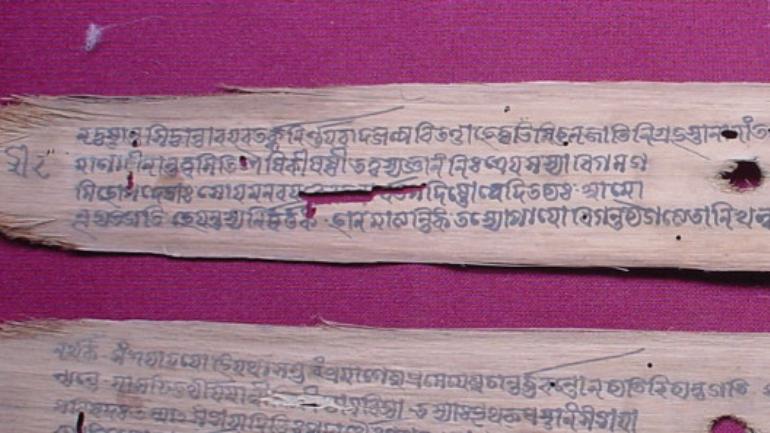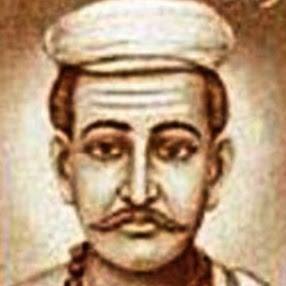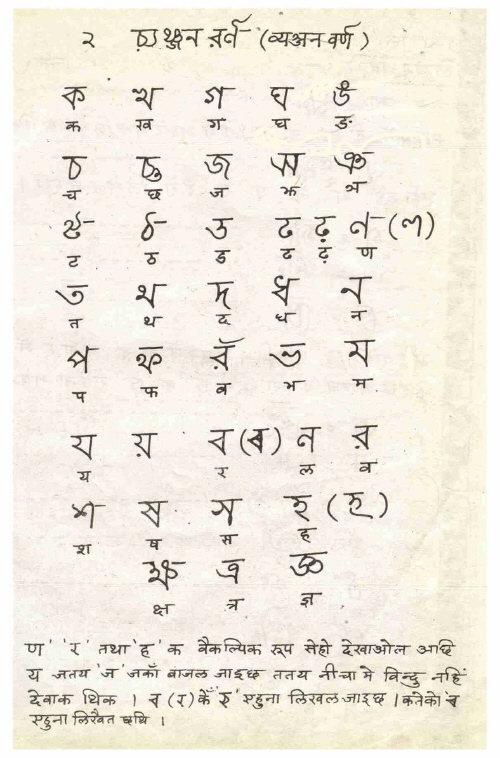
Maithili literature encompasses poetry, novels, short stories, documents and other writings in the Maithili language. The most popular literary figure in Maithili is the poet Vidyapati (1350–1450), who wrote his poems in the language of the masses, when sanskrit was state official language . After Vidyapati Maithili became more common in literature .
The Maithili script, Mithilakshara or Tirhuta as it is popularly known, is of a great antiquity. The Lalitavistara mentions the Vaidehi script. Early in the latter half of the 7th century A.D., a marked change occurred in the northeastern alphabet, and the inscriptions of Adityasena exhibit this change for the first time. The eastern variety develops and becomes the Maithili script, which comes into use in Assam, Bengal, and Nepal. The oldest recorded epigraphic proof of the script is found in the Mandar Hill Stone ( bounsi, banka district, bihar ) inscriptions of Adityasena in the 7th century A.D., now fixed in the Baidyanath temple of Deoghar.
Early Maithili Literature (ca. 700–1350 AD)
The period compromised of Maithili ballads, Maithili songs, and Maithili dohas. Some important Maithili writers of this era were:
- Jyotirishwar Thakur(1290–1350) whose Varnartnakar is the first prose and encyclopedia in northern Indian language.
Middle Maithili Literature (ca. 1350–1830 AD)
The period was of theatrical writings. Some important Maithili writers of this era were:
- Vidyapati(1350–1450)
- Srimanta Sankardeva(1449–1568)
- Govindadas(late 17th century)
Modern Maithili Literature (1830 AD to date)
Modern Maithili came into its own after George Abraham Grierson, an Irish, diligently researched Maithili lokgeet /folklore and transcribed its grammar. Grierson was said to judge that Maithili and its dialects could moreover be called as the language of the masses of Janakpur, Siraha, Saptari, Sarlahi, Darbhanga and Madhubani”.
Bible Society of India , in 2010, a translation of testament into Maithili was published under joint copyright with Nepal Wycliffe Bible Translators.
magazines and journals brought new development of maithilil in modern era Some important writers of this era are:
- Acharya Ramlochan Saran(1889–1971)
- Baldev Mishra(1890–1975)
- Krishna Kumar Jha ‘Anveshak”, Editor of Maithili Darpan Magazine and author of Mithila Anveshan
- Snehlata(
1909–1993). (Snehlata song has become very popular recently ) - Hari Mohan Jha ‘Kanyadaan, (1908-1984)
- Surendra Jha ‘Suman'(1910–2002) represented Maithili in the Sahitya Akademi
- Radha Krishna Choudhary(1921–1985)
- Jaykant Mishra(20 December 1922 – 3 February 2009) represented Maithili in the Sahitya Akademi
- Rajkamal Chaudhary(1929–1967)
- Binod Bihari Verma(1937–2003)
- Parichay Das(1964– )
- Gajendra Thakur(1971– )
- Subhadra Jha
- Bhola Lal Das
- Uday Chandra Jha Vinod
- (Prof) Surendra Lal Das – (1949-2018) (Aab ki ,Sanjog sa)
- Dilip Kumar Jha (1966- )
- Dr Chandramani Jha- from 1970
- Rabinadra Nath Thakur from 1972
- Shiv Kumar Jha Tillu- from 1990
- prakash Jha
Vidyapati
Vidyapati (1352–1448), also popularly known by the nickname Maithil Kavi Kokil ( cuckoo Poet of Maithili), was a Maithili and Sanskrit poet, writer and a multilingual .
Vidyapati’s clout was not just contained or limited to Maithili and Sanskrit literature but also reached far and wide to other Eastern literary traditions. In Vidyapati time, language such as the prakrit-derived late abahatta, had started to metamorphosed into early versions of the Eastern languages such as Maithili, Bhojpuri etc. Thus, Vidyapati’s clout on making these languages has been seen as “analogous to that of Dante in Italy and Chaucer in England”.

Life
Vidyapati was a Shaivite Brahmin born in the village of Bisfi in the present-day Madhubani district of Mithila region of Bihar, India. Shri Ganapati Thakur was his father, who was a Maithil Brahmin. The name Vidyapati is derived from two Sanskrit words, vidya (“knowledge”) and pati (“master”), Implying thereby “a man of knowledge”.
Vidyapati father, was a priest in the court of Rāya Gaṇeśvara, the proxy ruler of Tirhut. Infact his great-grandfather, Devāditya Ṭhakkura too was a Minister of War and Peace in the court of Harisimhadeva. Vidyapati also worked in the courts of various chiefs in North Bihar.Its been said he was having two wives, three sons and four daughters.
The Kīrttilatā gives hint of an incident where the Oiniwar King, Raja Gaṇeśvara, was murdered by the Turkish commander. Malik Arsalan was Turkish commander. By 1401, Vidyapati persuaded Jaunpur Sultan in overthrowing Arsalan and installing Gaṇeśvara’s sons, Vīrasiṃha and Kīrttisiṃha, on the throne. With the Sultan’s assistance, Arsalan was forced to quit the throne and Kīrttisiṃha, the oldest son, became the king of Mithila.
Mythology
In the last six centuries, Vidyapati’s life has been mythologised in myriad ways .His admirers attributes miracles to him and have explained his interaction with the Gods. One of the most important stories is one where Lord Shiva came down to earth to speak with Vidyapati, after being impressed with his righteousness.
Vidyapati, is famous for his love songs and prayers for Lord Shiva !!! Vidyapati is known as genesis or co institutor of Maithili Song
Maithili song of Vidyapati are sung by great Maithili singers like Udit Narayan, Sharda Sinha , kunj bihari
Currently maithili Singer has many new star Singer like Maithili Thakur, Poonam Mishra ,Keshav JHA, Madhav Rai,Rajni Pallavi, Madhvi Madhukar JHA, Adityanath Thakur,Arunita Jha and a few more. Maithili Thakur is most popular and she is a internet sensation now .
- All My Inhibition
All my inhibition left me in a flash,
When he robbed me off my clothes,
But his body became my new dress.
Like a bee hovering on a lotus leaf
He was there in my night, on me!
Other works
Vidyapati is regarded as father of Maithili Song which comprises bhajan and Lokgeet , but also composed on other topics including ethics, history, geography, and law. A few of his work include.
- Puruṣa Parīkṣādeals with moral teachings.Recently Publications Division of Government of India has brought out the Hindi Translation of Purusha Pariksha by Akhilesh Jha. There are 25 stories in the book selected from 44 stories in the original work. Besides, there are scholarly introductions to both Vidyapati and Purusha Pariksha in the book.
- Likhanabaliis about writing
- Bhu-Parikrama, literal meaning, around the world, is about local geography
- Vibhāgasārais autobiographical in nature
- Dānavākyāvalīis about charity
- Gangāvākyāvalī
- Varṣakṛtya
- Durgābhaktitaraṅgiṇī
- Śaivasarvasvahāra
- Kīrttipatākā
- Kīrttilatā
Clout in other literary traditions
Odia literature
Vidyapati’s magic or clout reached Odisha through Bengal. The oldest composition in Brajabuli is attributed to Ramananda Raya, (Godavari province , Governor ), Gajapati Prataprudra Dev,( king of odisha )He was a disciple of Chaitanya Mahaprabhu. He recited his Brajabuli poems to Chaitanya Mahaprabhu, when he first met him on the bank of river Godavari .
Bengali literature
The clout of the lyrics of Vidyapati on the love of Radha and Krishna on the Bengali poets of the medieval period was so profounding and deep down that they almost replicated all .. As an outcome an literary language was made, which was known as Brajabuli. It was developed in the sixteenth century. Brajabuli is naturally Maithili (as existed during the medieval period) but its forms were altered to look like Bengali. The medieval Bengali poets, Gobindadas Kabiraj, Jnandas, Balaramdas and Narottamdas composed their padas (poems) in this language. Rabindranath Tagore composed his Bhanusingha Thakurer Padabali (1884) Mixture of Western Hindi (Braj Bhasha) and archaic Bengali and christened the language Brajabuli as an imitation of Vidyapati (he initially promoted these lyrics as those of a newly discovered poet, Bhanusingha). Even during Bengal Renaissance in 19 century sri Bankim Chandra Chatterjee have also written in Brajabuli.
Tagore was much enchanted and captivated by Vidyapati.. He gave a new tune to Vidyapati’s Bhara badara.


